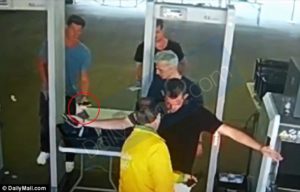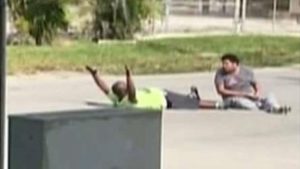Written by: Greg Ellifritz

Last week the police in Rio de Janeiro Brazil determined that three athletes from the US Olympic team falsified information when making a police report about a supposed “robbery.” It turns out that the athletes weren’t robbed. They got drunk, damaged a gas station restroom and were detained by a local security guard after trying to escape. The security guard made them pay for the damage they caused. The athletes reported that they were thrown on the ground by plain clothes police officers who then stole their wallets and cell phones.
The surveillance videos of their return to their dorms clearly show that the men had the wallets and cell phones that they had earlier reported stolen. The men had lied about the robbery. Ooops.
Why did the athletes lie to the police?
Who knows? It could be any number of reasons. People lie to the cops far often than most folks recognize.
I’m not talking about the people we arrest. We expect that the criminals will lie to us. I’m talking about lies told by crime victims and people calling the police. It’s a problem of epic proportions. It truly seems like almost every person who calls the police exaggerates the situation for one reason or another.
Those exaggerations get people hurt or killed.
One of the most egregious examples was the caller who described an emotionally disturbed and suicidal man sitting near a road with a gun in his hand. It turns out that the “suicidal” man was actually an autistic boy with his caretaker. The “gun” was a toy truck. Police arrived and mistakenly shot the caretaker (when trying to shoot the autistic boy) acting on the information they received from an exaggerating caller. How could someone mistake a kid playing with a toy for a suicidal man with a gun?

The caretaker shortly after being shot
I’ve noticed an uptick of this type of misinformation being relayed by people calling the police. A couple months ago, I took a call about a suicidal woman with a knife. Her mother called police and stated that the girl was trying to kill herself and had stabbed herself in the leg with the knife.
When we arrived (after driving lights and siren to the “emergency”), we found that the girl was mentally ill and off her meds. She was not, however, suicidal. She had been sitting calmly in her kitchen. She did not have a knife and had not stabbed herself. The mother lied about the circumstances to ensure a faster police response.
Three weeks ago, I got a call from a passerby about a disorderly person in a nail salon. The caller stated that a woman was obviously drunk and had been causing problems. The caller then stated that the woman was currently passed out drunk in a chair inside the salon.
The call didn’t come from the workers or customers in the nail salon. It came from an anonymous caller who was either walking or driving by.
I got to the salon and found the offender. It was a woman who was getting a relaxing hand massage after getting her nails done. While getting the hand rub, she had put her head down and closed her eyes. The woman was completely sober. The staff said she had not been unconscious, nor had she been disruptive.
Someone completely created a narrative in her own head after seeing a woman with her head down when driving past a nail salon.
You wonder how an autistic boy with a toy truck can be confused for a suicidal person with a gun? This is how it starts.
Last week, I responded to a call about a drunk driver who was driving recklessly in a gas station parking lot. The caller said the drunk was parked across three parking spaces, refusing to move and had caused a disturbance when he was confronted by a gas station employee. When I arrived, I found the man. He was parked across three parking spaces in the nearly empty parking lot. He had pulled over to compose a text. He was working and hadn’t consumed a drop of alcohol. No one had asked him to move his vehicle and there was no disturbance. The gas station staff hadn’t even noticed his presence. Another anonymous caller reporting a situation that didn’t exist.
I could go on and on. We get calls like this almost daily. The number of lies and exaggerations relayed to police dispatchers is truly monumental.
Why do people do this?
I’m not sure. I suppose that in some situations, people make honest mistakes. The problem is that a lot of these “mistakes” are so egregious that many of these calls border on the absurd. There is absolutely no way that some “mistakes’ can be attributed to a misunderstanding.
I think the majority of these calls are the result of the willful distortion of facts by the caller. I really think that some people lead boring and unfulfilling lives. They want more excitement and drama. They want to feel important by telling their friends about the “dangerous situations” they reported to police. They want to receive sympathy and adoration over social media for perceived good deeds when no such action ever took place. People just make shit up so that they can brag to their friends about their “exciting” lives.
I’ve seen this happen first hand on a couple of occasions. I’ve been shown social media feeds from people involved in some of the calls I’ve taken. What they post on Facebook doesn’t look anything like the calls I responded to. In every case, the person posting exaggerated the danger or severity of the crime with which they were involved. In every case, they portrayed their role as the “good guy” when in many case they were not. In every case, they received emotional support, words of comfort and even adoration from their friends or followers. I think that’s what these people crave. They do anything they can to feel better about their boring lives.
I remember a friend showing me one Facebook status that talked about a call I went on. The person writing on Facebook had absolutely nothing to do with the call. Yet she used social media to claim that she had attracted my attention to the problem by driving past me and flashing her headlights to alert me. All of her friends gushed praise that she had the courage to report the incident and summon a police officer. Only one problem. It didn’t happen.
I reviewed my cruiser video recording of the incident. There were no passing motorists. There were no flashing headlights. There was no evidence that the person posting on social media even saw the incident. Yet she lied about it and received words of praise from her Facebook “friends.” It happens way more commonly than you might think.
I could be wrong. Maybe people aren’t making things up just to feel better about their boring existence. The problem with that idea is that if they aren’t purposely making things up, they would have to be completely insane to report the kind of things that they report. I don’t know which is worse. Whether it’s caused by willful exaggeration or from mental illness, the consequences are real. People are forced to interact with police when no such contact is needed. With so many fake calls being generated, it’s no wonder that occasionally one goes really bad. I can truly see how the horrendous shooting in Florida could have been set in motion by the false information the police received.
What is the solution?
I don’t know.
I’m fearful that as social media takes an ever more prominent role in our lives, the number of such exaggerated calls to police will only increase. You should be absolutely terrified about that possibility. You could be doing absolutely nothing wrong and suddenly be confronted by a cop who is holding you at gunpoint based on faulty information that was provided on an exaggerated call to police. No one wins this game.
There are only a few ways to reduce the impact of exaggerated 911 calls. If you readers are making a call to the police, please attempt to be as accurate about the FACTS as possible. Don’t allow your subjective interpretations to color the description you give to dispatchers. Things are not always what they seem. The cops need the most accurate information possible to effectively prioritize and respond to the calls they are getting. When you exaggerate your problems, you may be diverting police resources from a far more serious crime happening someplace else at the same time.
My cop friends should be super leery of taking any call at face value. By all means, respond to the call and handle the problem. Just recognize in the back of your mind, that the situation is likely very different from the story the caller relayed to dispatch. Act accordingly.
Pay extra attention to those “anonymous caller” runs. If the caller isn’t invested enough in the situation to provide his name and address to the dispatcher, how invested do you think he will be in reporting all the facts correctly? Exercise more caution on those calls. That “anonymous” person making the call won’t be there to back you if you get in a shooting based on the faulty information he reported. Use your own judgement and evaluate the call for yourself before talking action. Don’t be afraid to ask your dispatcher to contact the caller for additional clarification if necessary. Lives depend on accurate information.
I’m certain that these words of advice won’t eliminate the problem. Until people start obtaining their self worth from doing good things in the world instead of from ephemeral praise from fake “friends” on social media, we will continue to deal with this issue.
I’m not hopeful for a quick resolution.

